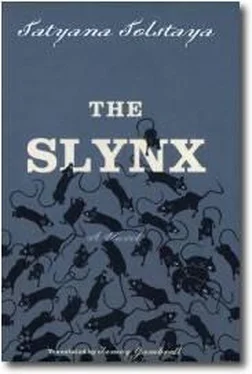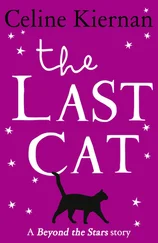Tatyana Tolstaya - The Slynx
Здесь есть возможность читать онлайн «Tatyana Tolstaya - The Slynx» весь текст электронной книги совершенно бесплатно (целиком полную версию без сокращений). В некоторых случаях можно слушать аудио, скачать через торрент в формате fb2 и присутствует краткое содержание. Жанр: Современная проза, на английском языке. Описание произведения, (предисловие) а так же отзывы посетителей доступны на портале библиотеки ЛибКат.
- Название:The Slynx
- Автор:
- Жанр:
- Год:неизвестен
- ISBN:нет данных
- Рейтинг книги:3.5 / 5. Голосов: 2
-
Избранное:Добавить в избранное
- Отзывы:
-
Ваша оценка:
The Slynx: краткое содержание, описание и аннотация
Предлагаем к чтению аннотацию, описание, краткое содержание или предисловие (зависит от того, что написал сам автор книги «The Slynx»). Если вы не нашли необходимую информацию о книге — напишите в комментариях, мы постараемся отыскать её.
The Slynx is a brilliantly imaginative satire set in a hypothetical Moscow two hundred years after an event termed "the Blast." The Blast has forever altered the landscape of Moscow. People now live with mutations, called Consequences. Some have cockscombs growing everywhere, some have three legs and then there are the Degenerators who are humans in doglike bodies. Some "Oldeners" still linger on. Their only Consequence is that they remain unchanged and seemingly live forever. They remember life before the Blast and moan the primitive cultural mores of the society they live in, where only the wheel has been invented thus far and the yoke is just catching on. This feudal landscape is ruled by Fyodor Kuzmich, Glorybe, a tyrant who rules with an iron hand. Kuzmich passes off all Russian literature as his own works and issues decrees at the drop of a hat to keep the public ignorant and docile.
The primary protagonist of The Slynx is a young scribe, Benedikt. His job is to copy all of Kuzmich's "works" on to bark, for use by the public. Benedikt marries a coworker, Olenka, and discovers the wonder of books through his father-in-law, Kudeyar Kudeyarich. His father-in-law, however, harbors nefarious plans to oust the current regime. Benedikt's love of books soon turns ugly and Kudeyarich channels this force to implement his own evil designs.
The Slynx is translated fluidly by Jamey Gambrell. One wonders how she worked in intelligent phrases such as: "You feel sorry for someone. Must be feelosophy." Tolstaya's descriptions of the futuristic backdrop where people eat and trade mice as currency are bizarre yet not hugely so. Sometimes she seems to be so in love with her own creation that the storyline tends to wander. But she does not stray too far and her prose dripping with rich imagery more than makes up for it.
Tolstaya's futuristic Russia might not be very different from the one she often complains about. "Why is it that everything keeps mutating, everything?" laments an Oldener, "People, well all right, but the language, concepts, meaning! Huh? Russia! Everything gets twisted up in knots." The perils of a society in which "Freethinking" is a crime and where an indifferent populace can be "evil" are ably brought out by the gifted Tolstaya. "There is no worse enemy than indifference," she warns, "all evil in fact comes from the silent acquiescence of the indifferent." The scary "Slynx," in the novel, is a metaphor for all the evil that is waiting to rear its ugly head on a sleeping people.
The Slynx's descriptions of a tyrannical society might be too simplistic to apply to Russia. Its reception in the country has been mixed. The newspaper Vechernaya Moskva commented: "After all that we have read and thought over about Russia during the last fifteen years, this repetition of old school lessons is really confusing. There is a surfeit of caricatures of the intellegentsia, of anti-utopias depicting the degradation and decay of the national consciousness, and postmodernistic variations on the theme of literary-centrism." That having been said, Tolstaya's haunting prose serves as a chilling reminder of the way things could be, especially when government censorship and other controls move silently back in. The "Slynx" is never too far away. History, as they say, does tend to repeat itself.












